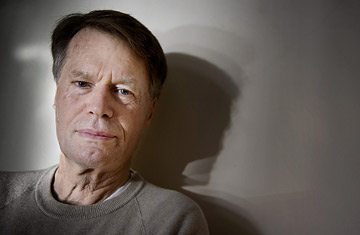
Jean-Marie Gustave Le Clézio, the 2008 Nobel Literature laureate, is described by the Swedish Academy as an "author of new departures, poetic adventure and sensual ecstasy"
Last week Horace Engdahl, the permanent secretary of the Swedish Academy, spoke out about the U.S.'s place in world literary culture. "The U.S. is too isolated, too insular," he said. "They don't translate enough and don't really participate in the big dialogue of literature. That ignorance is restraining." His remarks may have been a reference to the fact that the works of Jean-Marie Gustave Le Clézio, who today was awarded the 2008 Nobel Prize for Literature, are almost entirely out of print in the U.S. In its characteristically florid prose, the Nobel citation describes Le Clézio as an "author of new departures, poetic adventure and sensual ecstasy, explorer of a humanity beyond and below the reigning civilization." The sound of America's literary journalists searching Wikipedia en masse is deafening.
Like last year's winner, Doris Lessing, Le Clézio has strong ties to Africa — he was born in Nice in 1940, but his family history on both sides leads back to Mauritius, an island about 500 miles east of Madagascar that has been best known in the West, at least until now, as the home of the famously extinct dodo. The son of a doctor, Le Clézio grew up in France and Nigeria speaking French and English. He began writing at the age of 8 — one of his childhood efforts, composed on a long voyage to Nigeria, contains a list of his forthcoming works. His family traveled prodigiously, and Le Clézio's early experience with other cultures, and with exile, would mark everything he wrote in later life.
After attending university in Nice, Le Clézio achieved instant fame in 1963 with his first novel, Le proces-verbal, published in English as The Interrogation, a dark, wandering tale of a disaffected and possibly disturbed young man. It can be plausibly associated with the works of Sartre and Camus, but Le Clézio has never been easy to classify. Like the writers of the nouveau roman, he struggles with language itself and the ways contemporary life have drained it of meaning; he has often stated that his favorite novelists are James Joyce and Robert Louis Stevenson. Le proces-verbal was short-listed for the Prix Goncourt and won the Prix Renaudot, and Le Clézio has been in the front rank of French literature ever since.
In person, the author possesses a remarkable stony expression that clashes with his movie-idol good looks; he projects a physical sense of the intense focus and purposefulness that powers his writing. His protagonists are often humble people who blossom in the face of difficulty. His most important novel is generally considered to be Désert, published in 1980 and largely set in the Moroccan Sahara. A lyrical, occasionally hallucinatory work, it deals with the marginalized but still fundamentally vital lives of African nomads, as contrasted with the bleakness of modern urban European life. "Western culture has become too monolithic," Le Clézio said in a 2001 interview with the French newsmagazine Label France. "It places the greatest possible emphasis on its urban and technical side, thus preventing the development of other forms of expression — religiosity and feelings, for example. The entire unknowable part of the human being is obscured in the name of rationalism. It is my awareness of this that has pushed me toward other civilizations."
Le Clézio's literary output and his blend of fiction and ethics — he took up environmental causes long before they entered the collective consciousness — have made him one of the most popular writers in France. As far back as 1994, a poll by a French literary magazine found Le Clézio listed as the greatest writer in the French language. (Never one to show much, if any, emotion, Le Clézio responded to the result by saying, "I would have put Julien Gracq at the top.")
Le Clézio has never stopped writing — the Nobel citation lists 43 works in French — and rarely stopped traveling: in addition to France and Africa, he has spent years living in Mexico and Central America. Now 68, he and his wife, who is Moroccan, divide their time among Mauritius, Nice and Albuquerque, N.M. He is modern literature's consummate expatriate: the constant in his work is a sense of displacement and alienation, of humanity from the natural world, of adulthood from the idealized homeland of childhood and of Western civilization from its own emotional and spiritual vitality. "We no longer have the presumptuousness to believe, as they did in Sartre's day, that a novel can change the world," Le Clézio has said. "Today, writers can only record their political impotence ... Contemporary literature is a literature of despair."
— With reporting by Bruce Crumley / Paris
